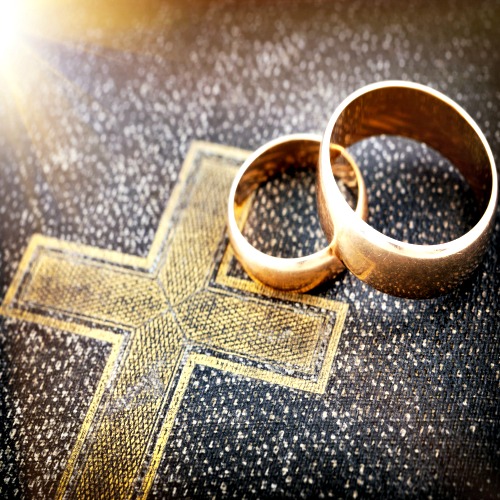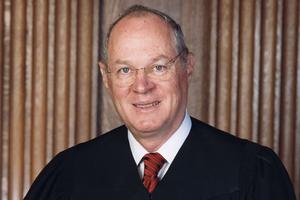Does Supreme Court’s Marriage Decision Protect Religious Entities?
COMMENTARY: For faithful Christians, Jews and Muslims, the ruling in Obergefell v. Hodges leaves more questions than answers.

In the days running up to today’s Supreme Court ruling on same-sex marriage (Obergefell v. Hodges), constitutional pundits predicted a wide range of outcomes: from the creation of a sweeping constitutional right to same-sex marriage to a ruling that leaves the issue to the states, to an outright rejection of marital rights for same-sex couples. The Supreme Court has now spoken and has broadly and unequivocally stated that there is a constitutional right to same-sex marriage.
The question now arises as to how this ruling will impact religious organizations that hold deep and sincere beliefs opposed to same-sex marriage. Will governmental authorities require churches and synagogues to perform same-sex marriage ceremonies? Will religious schools and universities be required to provide housing for same-sex couples? With regard to the clash between constitutional religious-liberty rights and the newly created constitutional right to same-sex marriage, the Supreme Court leaves us with more questions than answers.
In the April 28, 2015, oral argument on Obergefell v. Hodges, Justice Samuel Alito raised the issue of how a sweeping constitutional ruling that permits same-sex marriage might impact faith-based colleges and universities. Alito cited a 1983 Supreme Court case wherein Bob Jones University lost its tax-exempt status over a policy banning interracial dating and marriage. Alito asked Solicitor General Donald Verrilli whether the same situation might apply to a university or college that is opposed to same-sex marriage. Verrilli replied, “It is going to be an issue.” This exchange most certainly signaled that the cost of a broad Supreme Court declaration in support of same-sex marriage could lead to the erosion of religious-liberty rights for individuals and organizations opposed to same-sex marriage.
In the majority opinion, Justice Anthony Kennedy gives only slight attention to the friction between the right to same-sex marriage and religious-liberty rights, when he states:
“It must be emphasized that religions, and those who adhere to religious doctrines, may continue to advocate with utmost, sincere conviction that, by divine precepts, same-sex marriage should not be condoned. The First Amendment ensures that religious organizations and persons are given proper protection as they seek to teach the principles that are so fulfilling and so central to their lives and faiths.”
This would appear to be a concession that religious beliefs and practices opposing same-sex marriage should be respected and given proper constitutional protections. However, in the same paragraph, he goes on to state, “The Constitution, however, does not permit the state to bar same-sex couples from marriage on the same terms as accorded to couples of the opposite sex.”
Kennedy appears to be saying that, on the issue of same-sex marriage, religious liberty will be protected, but only to a certain extent.
In his dissenting opinion, Chief Justice John Roberts states:
“Today’s decision … creates serious questions about religious liberty. Many good and decent people oppose same-sex marriage as a tenet of faith, and their freedom to exercise religion is — unlike the right imagined by the majority — actually spelled out in the Constitution. … Hard questions arise when people of faith exercise religion in ways that may seem to conflict with the new right to same-sex marriage.”
In his separate dissenting opinion, Justice Clarence Thomas believes that this decision will have unavoidable and wide-ranging implications for religious liberty. In reference to this, Justice Thomas states:
“It appears all but inevitable that the two will come into conflict, particularly as individuals and churches are confronted with demands to participate in and endorse civil marriages between same-sex couples.”
Thomas criticizes the majority opinion when he states, “The majority appears unmoved by that inevitability. It makes only a weak gesture toward religious liberty in a single paragraph.”
Alito’s separate dissent provides an ominous warning of what may be to come, when he states that this decision will “be used to vilify Americans who are unwilling to assent to the new orthodoxy. In the course of its opinion, the majority compares traditional-marriage laws to laws that denied equal treatment for African-Americans and women. … The implications of this analogy will be exploited by those who are determined to stamp out every vestige of dissent.”
Unfortunately, the Supreme Court leaves us with too many unanswered questions with regard to how the Obergefell decision will effect religious institutions opposed to same-sex marriage. There are only two things that are a certainty.
First, because the Supreme Court has made such a broad and sweeping fundamental constitutional affirmation of the right to same-sex marriage, we can expect some degree of degeneration of religious rights, with regard to individuals and religious organizations that hold beliefs against same-sex marriage. This will not likely rise to a requirement that religious organizations preside over same-sex marriages, but will instead include ancillary activities of the organizations. Perhaps there will be a requirement that accommodations be made for same-sex marital student housing at religious universities. Perhaps the local parish hall that is rented to the public will be required to hold receptions for same-sex weddings.
Second, we are in for a long series of court battles. Both sides of this debate are passionate about preserving and even expanding their respective constitutional rights. With regard to the clash between religious constitutional rights and the right to same-sex marriage, the Obergefell decision leaves so many unanswered questions that we are bound to have decades of legal battles that define each side’s rights.
Today, most will claim that the Supreme Court has pronounced the final word on same-sex marriage. However, with regard to the clash between the rights of religious organizations opposed to same-sex marriage and the right to same-sex marriage, the battle has only started.
Michael Caspino is an attorney with the Law Offices of Buchalter Nemer, in Irvine, California.
He heads the firm’s nonprofit and religious organizations industry practice group, and he represents
dioceses and archdioceses throughout the United States.
- Keywords:
- chief justice john roberts
- justice anthony kennedy
- justice clarence thomas
- justice samuel alito
- michael caspino
- redefinition of marriage
- religious freedom
- same-sex 'marriage'
- u.s. constitution















